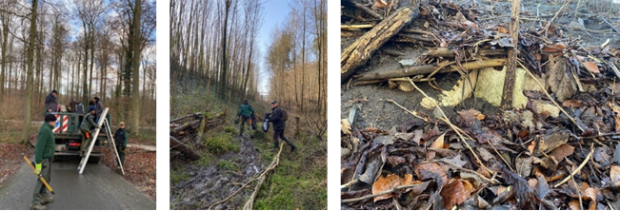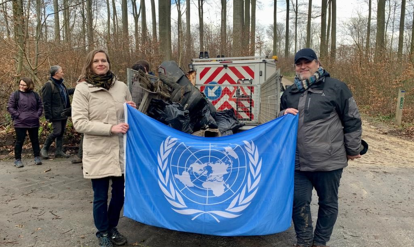UN and EU Officials Clear 400 kg of Litter from Forest Near Brussels to Raise Awareness on Plastic Pollution
Discussion details

Plastic bags, plastic bottles and food packaging, large plastic drink containers, a child seat, plastic vehicle parts, car tires, Styrofoam, sneakers… you name it… In the morning of 11 February 2022, 25 staff from the UN and EU offices in Brussels, together with six workers from the Agency for Nature and Forests of the Flemish Government under supervision of a Forester, collected 400 kg of litter during a clean-up action along the border of the Sonian Forest and Brussels highway crossings Quatre Bras and Leonard. Many of the plastic items found were of single-use. Disposed in the forest environment, they form a hazard to wildlife and pollute our ecosystems.
This cleanup aimed to raise awareness about the surge of plastic pollution around the globe and the need to address this with urgency. Plastic pollution poses a threat to life on land and in our seas. At least 11 million tonnes of plastic are discarded into world’s oceans every year, finding its way there through rivers and sewage systems. This is the equivalent of one garbage truck being dumped every minute. This figure is projected to double by 2030 and nearly triple by 2040.
Tackling plastic pollution hence requires adopting a source-to-sea approach. “If we want to reduce the leakage of plastic in the marine ecosystems, we need to address all sources of pollution along the whole lifecycle of a product, from production all the way to its disposal,” said Veronika Hunt Safrankova, Head of the UN Environment Programme (UNEP) Brussels Office at the event.
The clean-up of a total land stretch of approximately 5 km was organised by the UNEP Brussels Office in collaboration with the Agency for Nature and Forests, and involved staff from the UN (the Food and Agricultrue Organization of the UN, UN Office for Disaster Risk Reduction, and UNEP) and the European Commission and European External Action Service.
The EU is a leading partner in tackling plastic pollution with the objective of reducing discharge of plastics into the environment by covering all stages of the plastic life cycle and by adopting a circular economy approach to plastics. The EU’s plastics strategy as part of the circular economy action plan, outlines specific actions in more detail.
While only a small drop in the ocean of plastic waste, the joint UN and EU staff clean-up action contributes to the wider collective efforts to address plastic pollution.
This activity happened just days before the UN Environment Assembly (UNEA5.2), and in the backdrop of the One Ocean Summit taking place in Brest, France under the French Presidency of the Council of the EU.
The critical environmental challenge of plastic pollution will be addressed by the world leaders meeting at UNEA 5.2, taking place from 28 February to 2 March in Kenya. Plastic pollution, chemicals and waste management, and green recovery from COVID-19 are some of the issues to be discussed at the world’s highest-level decision-making body on the environment.
The clean-up activity supports UNEP ’s Clean Seas Campaign and the connected #EUBeachCleanUp initiative. The #CleanSeas campaign aims to break humanity’s reliance on unnecessary and avoidable plastic. In the coming years, the campaign will focus on communicating the root causes associated with the production, use and disposal of unnecessary, avoidable and problematic plastics.
This forest clean-up serves as a reminder that through more sustainable consumption each of us can help reduce the pressure on our fragile ecosystems.

Cleaning on the bank of the motorway (right) led to large amounts of plastic waste (left and middle).

Plastic waste was often buried (right), suggesting that it had been discarded for a long time.

(Left) Veronika Hunt Safrankova, Head of UNEP Brussels Office and (right) Raschad Al-Khafaji, Director of FAO Liaison Office with the European Union and Belgium, pose in front of collected waste
Background
Plastic Pollution
Plastic pollution poses not only a threat to marine life, but also to plants and animals that are based on land. A 2015 study estimates that one third of all plastic waste ends up in soils or freshwater. Most of this plastic disintegrates into particles smaller than five millimeters, known as microplastics, and these break down further into nanoparticles (less than 0.1 micrometer in size). Subsequently, these particles enter the food chain. The 2021 UNEP report ”From Pollution to Solution: A global assessment of marine litter and plastic pollution” studied the impact of marine litter and plastic pollution on the environment and their effects on the health of ecosystems, wildlife and humans. They found that plastic pollution poses a growing threat to all ecosystems from source-to-sea. It also shows that while we have the knowledge, we need a strengthened political will and urgent action by governments to tackle the mounting crisis.
UNEA
The resumed session of the UN Environment Assembly (UNEA 5.2) convened by UNEP will bring together representatives of 193 Member States of the UN, as well as business leaders, civil society and environmentalists from around the world in a hybrid format in Nairobi (Kenya). Under the overarching theme of “Strengthening Actions for Nature to Achieve the Sustainable Development Goals”, discussions will highlight the pivotal role of nature in social, economic and environmental aspects of sustainable development. At this session, the Member States will aim to “make further progress in the implementation of resolutions and decisions from previous sessions of the Environment Assembly, including on the future of the Global Environment Outlook, and on marine litter and micro plastics”. Read more about environmental milestones of 2022.
Clean Seas
Since its launch in 2017, the Clean Seas campaign has helped galvanize a global movement to turn the tide on plastic pollution by reducing the use of unnecessary, avoidable and problematic plastics including single-use plastics and phasing out intentionally added microplastics. The campaign will now highlight source to sea issues, propose solutions and call for urgent global action.
EU Beach Clean up
The EU organizes this global campaign for clean, plastic-free oceans every year in September. This features events across the world. The EU Beach Cleanup is part of the EU Green Deal. Read more about #EUBeachCleanup 2021.
The Agency for Nature and Forests
The Agency for Nature and Forests of the Flemish Government cherishes, protects and develops over 222,000 acres of nature areas, forests and parks in Flanders, Belgium. Nature and Forests loves to support precious nature projects, financially and through sharing its craftsmanship. For more information see: www.natuurenbos.be
Link to related Facebook post: UN Environment Programme Europe - Home | Facebook
Log in with your EU Login account to post or comment on the platform.